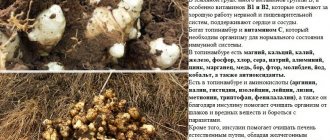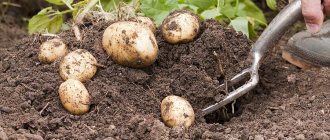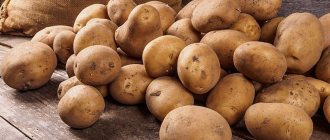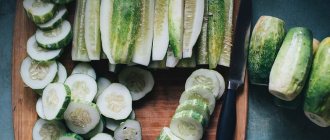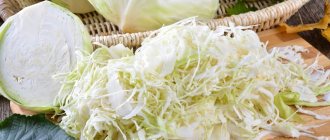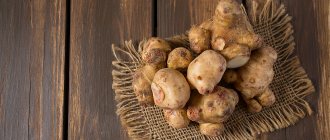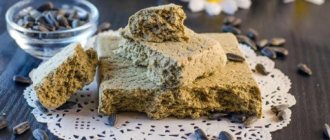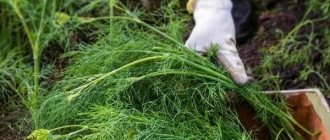When to collect (dig up) Jerusalem artichokes for the winter
Usually the earthen pear is dug up at the end of the autumn period. But there is no need to rush to harvest before the autumn rains: early harvesting will produce small, tasteless tubers. In order not to be disappointed in the meager harvest, let’s listen to the advice of experienced gardeners who do not recommend harvesting it ahead of time.
Nutrient components move from the stem and leaves to the roots of the plant in September-October, sometimes extending into November. At this time, the largest amount of carbohydrates accumulates in the tubers, giving them a sweetish taste, and they gain weight. If you cut the stems and foliage too early, you will be left without a third of the harvest.
Gardeners who have been growing Jerusalem artichoke for several years advise cutting off the stems before frost, leaving cuttings 20 cm high. After one and a half to two weeks, you can start harvesting the tubers - they will just ripen.
When to collect (dig up) Jerusalem artichokes for the winter
Important: dug up tubers must be urgently hidden from the sun and heat - under their influence the crop quickly begins to deteriorate.
Beneficial features
As soon as people liked Jerusalem artichoke, they began to notice the benefits it brings. Today, the list of beneficial properties of earthen pear is impressive. Here are the most important of them:
- excretion of bile and urine;
- calming the central nervous system;
- cleansing from harmful elements;
- liver restoration;
- elimination of inflammation;
- strengthening the immune system;
- suppression of bacteria and viruses;
- neutralization of the effects of harmful elements in the body;
- promoting better blood clotting;
- preventing the development of tumors;
- stopping diarrhea;
- wound healing;
- cell restoration;
- prevention of diabetes and atherosclerosis;
- pain relief.
Proteins in tubers affect the hormonal system, muscle growth, and are involved in strengthening the immune system and insulin synthesis. They contain 16 amino acids, several of which the human body cannot produce.
The ash contained in the earthen pear has an anti-inflammatory, wound-healing, hemostatic effect, and also promotes the dissolution of blood clots.
Potassium regulates metabolism, normalizes water balance, relieves swelling, strengthens the heart and blood vessels, normalizes blood pressure, and relieves spasms.
Calcium , in addition to participating in the functioning of the cardiovascular system, cleanses the body of harmful elements.
Magnesium strengthens bones and improves the functioning of the central nervous system.
Sodium normalizes water-salt and maintains acid-base balance.
Iron is an important element in hematopoiesis and the functioning of the immune system.
Phosphorus ensures energy metabolism, stimulates mental and physical activity, and has a beneficial effect on the functioning of the kidneys and heart.
Thus, Jerusalem artichoke is recommended for use by diabetics, hypertensive patients, people suffering from kidney diseases, digestive system disorders, those suffering from acute respiratory viral infections, having problems with the heart and blood vessels, as well as those who want to cleanse the body of harmful elements and restore the microflora in the intestines.
How to store Jerusalem artichoke tubers
To begin with, we remember that although Jerusalem artichoke is similar to potatoes, it is not one, and will not be stored all winter if you simply put it in the basement or basement. And you need to store it in rooms or places where the temperature is 1-4 degrees and humidity is no more than 85%.
Ground pear can be stored in the cellar, refrigerator, freezer, dried or canned. Let's look at these storage methods in more detail.
How to store Jerusalem artichoke in the refrigerator and freezer
If you don’t know how to store Jerusalem artichoke in your apartment, use the refrigerator or freezer.
Ground pear can be stored in the refrigerator for no more than 3 weeks. To store its tubers, we wrap them in a cloth moistened with water or put them in bags or plastic containers where air does not penetrate, and put them in the lower section of the refrigerator.
The main thing is that the tubers do not lose moisture - this way they will quickly become unusable.
If you want to store the tubers longer, storing them in the freezer will increase this period to 3 months.
How to store Jerusalem artichoke tubers
How to freeze Jerusalem artichoke
- Whole tubers.
- Sliced.
- In grated form.
Before preparing and storing in the freezer, be sure to wash the root vegetables and peel them. We put whole or chopped tubers into bags or plastic containers and put them in the freezer.
How to store Jerusalem artichoke in the cellar
If you have collected a decent harvest of Jerusalem artichoke, and it definitely will not go into the refrigerator and freezer, we use storage in the cellar or basement using any of the methods.
- We fill the tubers folded in bags or wooden boxes with earth or wet sand and put them in the cellar.
- We sprinkle the tubers folded in wooden boxes with sand or sawdust and store them in the cellar.
- We cover each tuber with paraffin and store it in the cellar.
Important: you should not clear the soil from the dug up Jerusalem artichoke - it helps the tubers to be stored longer.
How to store dried Jerusalem artichoke
Dried pear tubers are stored very well. Dried Jerusalem artichoke retains all biologically active substances and beneficial properties. Let's find out how to dry earthen pear tubers.
Ingredients
- 1 liter of water;
- 1 kg of tubers;
- 1 tsp citric acid.
How to dry Jerusalem artichoke
- Pour cold water into the pan and add the dug up tubers. After soaking the remaining soil, thoroughly wash the tubers with a brush.
- Dilute citric acid in a liter of water.
- We peel the Jerusalem artichoke, removing a thin layer, and immediately place it in a solution of citric acid.
- Cut the tubers into thin translucent slices and dry them a little, spreading them out on paper towels.
- Cover the baking sheets with parchment and lay out the dried slices.
- Turn on the oven at 100°C and, when it warms up, place the baking sheets.
- We dry the Jerusalem artichoke slices with the door slightly open for several hours. The main thing is that they do not burn.
- When they are dry, cool them and place them in glass or cardboard containers.
From 1 kg of tubers you get 150 g of dried earthen pear, which should be stored in a dry, dark place for no longer than 1 year.
How to store Jerusalem artichoke in winter
Dried Jerusalem artichoke can be eaten as chips, added to dried fruit compote and vegetable dishes, or prepared as a vitamin tea (brew 1 tablespoon of crushed dry cloves with a glass of boiling water).
And if you dry it until dark and grind it into powder, you get the raw material for a healthy drink reminiscent of coffee.
Storage features: drying and freezing
For residents of apartment buildings, the number of storage options is limited. The most affordable options are drying or freezing the tubers. You can preserve the best properties of the vegetable on the balcony, but for this you will need containers with sand or soil. Instead of containers, it is permissible to use bags of peat or sawdust.
Freezing involves cleaning and washing the roots. The prepared tubers are cut into cubes or strips and blanched in milk and curd whey. The temperature is maintained at at least 95°C. In terms of time, the last procedure takes 10 minutes. The resulting products are frozen after cooling.
Many housewives prepare Jerusalem artichoke by drying. Only strong and undamaged tubers are suitable for drying. Preparatory work includes washing with running water, peeling and cutting into small pieces. Root vegetables are dried naturally, in an oven or using special household equipment. When storing a large number of vegetables in one place, it is extremely undesirable to place Jerusalem artichokes together with potatoes or beets; only carrots will be a good neighbor.
Advice. To prevent metal oxidation, it is better to use a bone or ceramic knife for cutting.
The healing tubers are known to few housewives. These gifts of nature must be stored and used wisely. Only then can you get the maximum benefit from this root vegetable, because it contains useful components such as fiber, organic acids and pectin.
How to prepare Jerusalem artichoke for the winter
Jerusalem artichoke can not only be frozen and dried: it makes delicious preparations for the winter. Here are several recipes for preparations from earthen pear tubers.
Jerusalem artichoke winter salad
Ingredients
- Ground pear tubers - 1 kg;
- Carrots – 0.5 kg;
- Salt;
- Lemon – 1 pc.
How to prepare Jerusalem artichoke for the winter
How to prepare winter salad
- We cut carrots and Jerusalem artichoke tubers.
- Three lemons on a grater.
- Mix chopped vegetables with lemon mixture and add salt.
When the mixture releases its juice, put the salad into jars and pasteurize them for about half an hour.
Pear jam
Ingredients
- Pumpkin pulp - 1 kg;
- Jerusalem artichoke tubers – 1 kg;
- Lemon – 1 pc.;
- Granulated sugar - 250 g.
How to make Jerusalem artichoke jam
- Chop the tubers and pumpkin pulp.
- Three lemons on a grater.
- Mix all the ingredients and wait for the mixture to infuse.
- Place the mixture on the stove and after boiling, cook for five minutes.
- Pour hot jam into jars.
We cover the jars with a blanket, and after 24 hours we put them away for storage in the cellar or refrigerator.
Ground pear with sea buckthorn juice
Ingredients
- Water – 2 glasses;
- Jerusalem artichoke tubers – 1 kg;
- Sea buckthorn juice – 1 glass;
- Granulated sugar - 200 g.
Earthen pear with sea buckthorn juice
How to cook Jerusalem artichoke jam with sea buckthorn juice
- Peel the washed tubers and cut into slices.
- Mix sea buckthorn juice and water.
- Fill the slices with this mixture and add granulated sugar.
- Place the mixture over medium heat and remove when it boils.
Transfer the jam into sterile jars, cover with lids and pasteurize. If the jars are 0.5 liters, pasteurize for 10 minutes, 1 liter - 15 minutes.
Jerusalem artichoke in marinade
Ingredients
To prepare the marinade: 2 liters of water and 800 ml of table vinegar.
For putting in jars: 1 g of coriander powder, a head of garlic and 1 kg of earthen pear tubers.
To prepare the brine: 3 tbsp. coarse salt and 2 liters of boiled water.
How to pickle Jerusalem artichoke
To pickle the tubers of this plant, follow the step-by-step recipe:
- We wash the Jerusalem artichoke tubers with a stiff brush and hydrogen peroxide and remove the tendrils.
- Place the tubers in sterile jars.
- Prepare the brine for pouring from water and salt, boiling it for 2 minutes. Remove from the stove and wait 15 minutes.
- Pour brine over the tubers, cover and put in a cool place for a week. Then drain the brine.
- Prepare the marinade: put the water on the fire and after boiling, add the coriander, pour in the vinegar and remove from the stove.
- Add garlic cloves to the jars with tubers. Cleaning and cutting them.
Pour the marinade into the jars, close and wait three days: after that you can try the pickled Jerusalem artichoke.
Compound
To understand what healing properties a plant has, consider its chemical composition. Note that it is in many ways similar to the composition of potato tubers. Jerusalem artichoke contains:
vitamins:
- A - 2 mcg (0.2% of the daily value for humans);
- beta-carotene - 0.012 mg (0.2%);
- thiamine (B1) - 0.07 mg (4.7%);
- riboflavin (B2) - 0.06 mg (3.3%);
- ascorbic acid (C) - 6 mg (6.7%);
- alpha tocopherol (E) - 0.2 mg (1.3%);
- Niacin (PP) - 1.6 mg (8%).
microelements:
- aluminum (Al) - 815 μg;
- iron (Fe) - 0.4 mg (2.2%).
macroelements:
- potassium (K) - 200 mg (8%);
- calcium (Ca) - 20 mg (2%);
- magnesium (Mg) - 12 mg (3%);
- sodium (Na) - 3 mg (0.2%);
- phosphorus (Ph) - 78 mg (9.8%).
In addition to all the above elements, earthen pear contains digestible carbohydrates: starch, dextrins, sugars.
The nutritional value of Jerusalem artichoke is 61 kcal (3.6% of the daily value for humans). 100 g of tubers contain 2.1 g of protein, 0.1 g of fat, 12.8 g of carbohydrates. 4.5 g is dietary fiber, 79 g is water.
